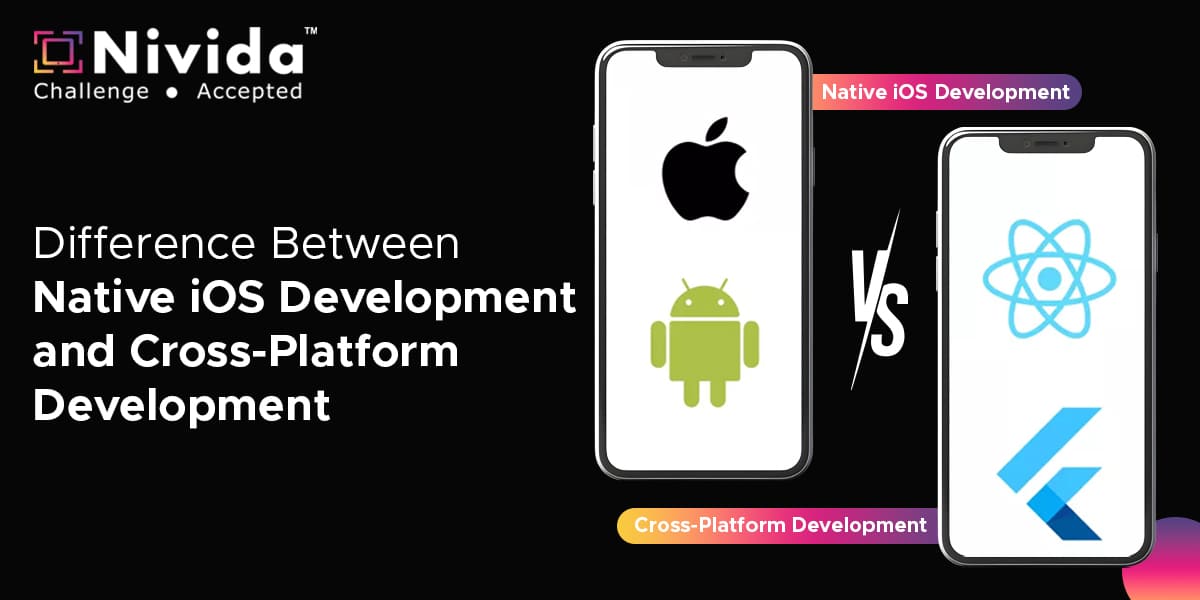Nivida Software, being recognised as the Best iOS Development Company in India, believes that it is our responsibility to simplify this choice for you. Technology decisions can be overwhelming, especially when budgets, timelines, and future scalability are involved. We have worked with enterprises, start-ups, and mid-sized businesses, and we have seen both approaches succeed in different scenarios. In this blog, we will walk you through the core differences, the advantages, and the trade-offs, so that you can make an informed decision for your next digital product.
What is Native iOS Development?
When we talk about native iOS development, we mean building applications exclusively for Apple devices using programming languages like Swift or Objective-C. In this approach, the application is created with tools provided by Apple itself, such as Xcode and UIKit. This gives developers direct access to hardware features, operating system APIs, and the latest updates rolled out by Apple.
We personally enjoy working with native iOS development because it allows us to fully harness Apple’s ecosystem. From advanced security features like Face ID to seamless integration with Apple Watch or AirPods, native development ensures that your application feels smooth, polished, and completely in sync with the device. When you choose to work with us, you’re not only getting code, you’re getting years of experience in pushing iOS apps to their maximum potential.
What is Cross-Platform Development?
Cross-platform development, on the other hand, is about writing one codebase that runs across multiple operating systems, like iOS and Android. Tools like React Native, Flutter, and Xamarin make this possible. Instead of maintaining two separate teams, one for iOS and another for Android, you can build once and deploy everywhere.
At Nivida Software, we have observed that cross-platform development is especially attractive to start-ups and businesses aiming to test the market quickly with a single version of their app. It reduces costs, shortens time-to-market, and ensures your product reaches a larger audience in less time. However, this convenience comes with its own set of compromises, particularly when it comes to performance, user experience, and access to platform-specific features.
Performance: Speed vs Convenience
Let’s be honest: if your priority is raw performance, nothing beats native iOS development. Native apps can handle complex animations, large amounts of data, and resource-intensive operations much better than cross-platform apps. This is because they communicate directly with the operating system without needing a “bridge” in between.
Cross-platform frameworks have come a long way, and their performance is good enough for most use cases. But if you are building a gaming app, a high-end AR/VR application, or something that requires deep integration with device hardware, native is the safer bet. That being said, for simpler apps like e-commerce platforms, lifestyle apps, or service-based applications, cross-platform development performs reasonably well while saving both money and time.
User Experience and Design Consistency:
As a company that takes pride in being one of the Best iOS Development Companies in India, we cannot stress enough how important user experience is. Native iOS development allows us to follow Apple’s Human Interface Guidelines closely, giving your app a design that feels truly “Apple-like.” This means smoother gestures, faster load times, and an overall premium feel.
Cross-platform development tries to mimic native design but often falls short in small details. For instance, certain iOS-specific animations or navigation patterns might not feel as smooth in a cross-platform app. If your business model depends heavily on customer experience, say, a luxury shopping app, going native can help you stand out. But if your main goal is accessibility across devices, cross-platform can still deliver a good, consistent design across iOS and Android.
Cost, Budget, and Resources:
Let’s talk about the part that everyone is most concerned about: cost. Developing native iOS apps usually requires more investment since you are building specifically for one platform. If you also want an Android version, you’ll need to build it separately, which doubles the cost.
Cross-platform development is cost-effective because a single team can handle both platforms simultaneously. If you’re a start-up trying to validate your idea, this approach helps you save valuable resources. At Nivida Software, we always sit down with our clients and evaluate budgets before recommending a path. Sometimes, starting with a cross-platform MVP and later moving to native versions once the product gains traction makes the most sense.
Scalability and Maintenance:
Native iOS applications are easier to scale in the long run. Whenever Apple releases a new feature, developers can adopt it almost immediately in native apps. This ensures your app stays updated, secure, and future-ready. Maintenance is also smoother because everything is built for one specific platform.
Cross-platform applications may face delays in adopting the latest features since frameworks need time to catch up with iOS and Android updates. Also, debugging issues can be more complicated because you’re essentially working with an extra layer between your code and the operating system. That said, with a strong development partner like us, these challenges can be minimised significantly.
Security Considerations:
Security is another area where native development shines. Apple is known for its robust security ecosystem, and native iOS apps can take full advantage of this. From data encryption to secure APIs, native apps give you a higher level of trustworthiness.
Cross-platform frameworks are secure as well, but since they rely on third-party plugins, there might be occasional vulnerabilities that require patching. If your application deals with sensitive data like banking information, healthcare records, or personal details, we strongly advise going for native iOS development to minimise risks.
Making the Right Choice:
So, which one should you choose? The answer depends on your business goals, budget, and priorities. If you want the highest performance, best user experience, and stronger long-term scalability, native iOS development is the way forward. If you want to save costs, reach both iOS and Android users quickly, and validate your idea in the market, cross-platform development is the smarter choice.
At Nivida Software, we don’t just provide solutions; we guide you in making the right decisions. Whether you want to build a native iOS application or a cross-platform product, our team is here to support you at every step. If you are looking to Hire iOS Developer in India, we can offer you highly skilled professionals who understand not only the technology but also your business needs.
Final Thoughts:
Choosing between native and cross-platform is not about right or wrong; it’s about what fits your unique situation. Our philosophy at Nivida Software is simple: we listen, we analyse, and we deliver. With us as your technology partner, you’ll never have to make these tough decisions alone. We bring clarity, honesty, and decades of expertise to the table, ensuring your digital journey is smooth, successful, and future-proof.
So, if you’re ready to take the next step, let us help you craft an app that not only meets expectations but exceeds them. After all, being the Best iOS Development Company in India is not just a title for us, it’s a responsibility we live up to every day.

